- Home
- Kelley Armstrong
Wherever She Goes (ARC) Page 9
Wherever She Goes (ARC) Read online
Page 9
I’m sorry, Dad. I didn’t understand.
I heft the gun—a Glock 19—and I remember the day Ruben tried to hand me a Ruger LC9. Until then, I’d worked from my laptop, hacking security systems so his group could break in. That day, two members were out sick, right before a massive job.
“We just need eyes on the ground,” Ruben said. “The same thing you do from your computer, except IRL.”
He actually said “IRL” as if we “tech geeks” spoke in text acronyms.
“You’ll get your cut, plus one of theirs,” he said.
“I want both of theirs.”
He laughed. “You can’t do the job of two—”
“If I can, you’ll pay me both their shares?”
He agreed . . . and he paid out. After that, I was no longer sitting on my laptop. I learned how to wield a set of lock picks. I learned how to case a property. I learned how to steal . . . IRL, as he’d put it.
Yet when he’d tried to hand me the Ruger, I refused.
He rolled his eyes. “Let me guess. Army Girl needs a bigger gun.”
“No, ‘Army Girl’ doesn’t carry a gun. That escalates a situation.”
“That’s the idea, kid.”
We argued. I won, and never once did I regret being unarmed. Not even after the last job, when the guy who was playing “eyes on the ground” screwed up, and the returning homeowner shot me in the shoulder. Afterward, Ruben said, “I bet you wish you’d had a gun for that.”
No, I was glad I hadn’t, or I might have returned fire, and a guy defending his property did not deserve that. I did deserve what I got, and that awareness proved I was no longer the angry kid who signed on with Ruben.
It was the proverbial wake-up call, not even the shot itself so much as what followed—the realization that I couldn’t check into a hospital. Not with a gunshot wound. Ruben knew people. Doctors, or those who passed for doctors, because honestly, someone who takes cash for off-the-books medical care has probably lost his license, and not through a tragic miscarriage of justice. So I pay the price, with the pain in my shoulder as a constant reminder of a choice I made.
I put the gun into my purse, and my phone rings, making me jump. I look to see an unfamiliar number. I answer.
“Aubrey?” a woman’s voice asks.
“Yes?”
“It’s Gayle. Gayle Lansing. I wanted to thank you for the flowers.”
It takes a minute to realize what she’s talking about. Hell, it takes a minute to remember who she is. Standing here with a gun, among the ghosts of my storage locker, I am someone else. I am the Aubrey who’s never had a husband, never imagined she would have one, certainly not a woman who envisioned she’d someday have an ex-husband with a girlfriend.
I cover my hesitation with a babble of “Oh, you’re welcome” and “Thank you again for taking Charlie.” That goes on for a few exchanges—her with “I was happy to” and me thanking her again and her assuring me it’s all good.
Then she says, “I wanted to ask you a favor. About this weekend. Is there any chance Paul can keep Charlie for Saturday?”
“Keep her?”
“I know he brings her over first thing Saturday morning, but it’s my daughter’s birthday, and we were going horseback riding. Charlie would love it.”
My hackles rise. I force them down. Gayle isn’t inventing special treats to woo my daughter. She’s taking her daughter for her birthday and asking Charlotte to join.
Still, I can’t resist saying, “I don’t think she’s old enough for horses.”
Gayle laughs. “Oh, of course, she isn’t going to ride by herself. She’ll be with Paul. And I haven’t mentioned it to her, so if you would rather not, I completely understand. Libby would love to have her along, though, and we could bring Charlie to you first thing Sunday morning.”
“Why not Saturday night?”
There’s a pause. Then, “The horseback riding is in Wisconsin, so it’s a bit of a drive. I know you had Charlie this week for an extra night, so I thought you might like the evening to yourself. We’ll bring her first thing.”
She’s being reasonable. Perfectly reasonable. Which only makes some childish part of me dig in her heels and want to be unreasonable. That extra night had been a bonus, not a chore, and I will take every one with my daughter that I can. Also why the hell didn’t she ask this sooner? It’s Friday night, for God’s sake. I might have had our weekend planned.
Except I didn’t, and the reason she’s asking now is because she’s met me. We have exchanged our peace offerings—she got me the princess tea reservation and I sent flowers. She has to have been worried about me, what kind of person I’d be, how I’d treat her, and now all is fine, so she’s taking a chance on asking for Charlotte to come to her daughter’s party.
Yet even as I calm myself down, there’s a part of me that cannot help but wonder whether I’m misreading this entirely.
Could this be Paul’s idea? He thinks I’m a wee bit unstable right now. Did he confess his fears to Gayle?
“I . . . just don’t want Charlie going over this weekend.”
“Wait. I have an idea, Paul.”
Have they conspired to undermine my parental rights?
Or am I being a paranoid bitch even considering that?
I shift my weight, and as I do, I feel the extra heft of the gun in my purse.
Charlotte.
I forgot about Charlotte.
I didn’t forget she was coming for the weekend, of course, but I failed to put the pieces together. I was retrieving a gun to take home . . . when Charlotte will be there.
If I am so concerned about safety that I’m getting a gun, should I even have Charlotte over?
No, I’m overreacting on the threat. Charlotte is not in danger. I do not need a gun. I could put it back and insist on taking Charlotte tomorrow. Still . . .
I make it clear to Gayle that I don’t require an extra night off and that I’m more than happy to take Charlotte anytime Paul needs it. However, I don’t want to interfere with their plans. Bringing her Sunday morning is fine.
We make arrangements. After I sign off, I tuck the gun back into its hiding place. If I need it, I’ll come back—after Charlotte’s gone.
Gayle’s call caught me off guard. The more I think about it, though, the more suspicious I become. The drive home from Chicago, in Friday-night traffic, gives me plenty of time to think. Too much time.
After that call, part of my brain whirls like a cyclone of paranoia. A little homunculus inside my head runs in circles shouting “Doom! Doom! Doom!” like a cartoon character. That is the worst side of me. The most childlike side. The most guilty side. The part that is somehow convinced I have gotten off far too easy in life, considering my crimes, and the hammer of karma hangs over my head, waiting for the absolute worst way to punish me.
You are a thief, Aubrey. You stole from people, and you were not caught, and that ache in your shoulder doesn’t repay your crimes.
You think you can run from all that? Fall in love and marry a great guy and have an amazing child and a perfect life? You think that a marriage breakup is the worst thing that can happen? Think again.
The worst thing that can happen is that I lose my daughter. Not through a court of law, but through a foe I cannot fight. Through Charlotte herself. She lives in the only home she’s known. Sleeps in the only bedroom she’s known. She lives there with her perfect daddy, and the only thing missing is her mommy. But what if another mommy comes along? A mommy who’ll take her to princess teas when her own mother forgets. A mommy who’ll whisk her off on surprise horseback rides and birthday parties. A mommy who brings a cool older sister and brother. A mommy who could slide into that house and take her mother’s place, and everything will be the way it was. No, everything will be better.
I want to scream at that version of Gayle, the one who knows exactly what she’s doing, the one who wants to steal my daughter, steal my place. Steal my husband? I can say I’m happy for Paul,
but is there a tiny part that hoped for some fantasy reunion? Yes. Yes, there is. And it isn’t tiny. Not at all.
Yet Gayle isn’t that monster. She’s just a woman who’s gone through her own divorce and has now met a wonderful guy . . . a guy I gave up. While part of me wishes she would move a little slower—does Charlotte really need to go to your daughter’s party already?—that might just be my own fears speaking. The fears that know this is one step along a road I don’t want to see them take.
Whatever Gayle’s intent, Paul is up to something. It’s too coincidental otherwise. We parted on bad terms yesterday. Could this be his revenge? That’s not the man I know, but I have hurt him—I know that—and maybe he’s finally lashing out.
Whatever the answer, he should have been the one to call me. That’s what I realize during that drive home, what I’d missed earlier, in my confusion. Paul wanted a day of my time with our daughter. Time that we had agreed upon. We allow for exceptions, of course. We were determined never to put our own needs above our child’s. We’ve negotiated these exceptions with no actual negotiation required. The one who said “I’d like her for x” was the one who also said “I know that isn’t our arrangement, so here’s how I suggest making up for it.”
His requests are always reasonable, and so I am reasonable in return. Even this one—for Gayle’s daughter—is logical. So he should have called me.
Having Gayle phone only makes me more suspicious. Makes me wonder whether adding Charlotte to the outing seems last minute because it is last minute.
“I . . . just don’t want Charlie going over to Aubrey’s this weekend.”
“Wait. I have an idea, Paul. Why don’t we invite Charlie to Libby’s party?”
“I would love that. I’m just . . . I’m not sure Aubrey will go for it. She knows I’m upset. She might see through this.”
“Here, let me handle it.”
I’m in Oxford when my phone rings. It’s almost midnight. I go to grab it. I’d never talk on my cell with Charlotte in the car, but she’s not here, and I’m certain it’s Gayle calling again or maybe Paul this time.
“On second thought, I think we should keep Charlie for the whole weekend. She’ll be so tired Sunday.”
I snatch up the phone, only to see a private number. I pull over and let it ring to voice mail. Then I retrieve the message.
“Ms. Finch? It’s Laila Jackson from the Oxford PD. Please call me back.” She rhymes off a number.
I sit there, holding the phone. If it were Officer Cooper, I’d be hitting those digits as fast as I could, certain he was calling to say they’d finally realized I was right—their dead woman had a son, who is now missing.
But it’s his partner, the woman who really doesn’t like me, which means this almost certainly isn’t a you-were-right call. Still, I cling to that hope and replay it a couple of times, as I listen to her tone. It’s crisp, sharp even. Laila Jackson does not sound like a woman calling to tell me she’s made a horrible mistake.
She knows I’m the one who left that anonymous tip about Kim. I’m sure of it. I was careful. I found a pay phone, which isn’t easy to do these days. I made sure it wasn’t near my home or work. I left nothing that could identify me. I even pitched my voice lower, and there’d been enough traffic in the background to add to the distortion.
It doesn’t matter. A woman called leaving that tip, and Jackson is convinced I’m an attention-seeker. She’ll know it was me.
Does that mean they’re ignoring the tip? Has she said “Oh, I know who that is” and told the department she’ll handle it?
Just ignore her. She’s a bit of a nutjob.
My fingers hover over the keys. I need to set her straight. I need to make sure the police investigate. Finding this boy isn’t my job, damn it. I’m not that person anymore. Not someone who puts her own safety in danger, breaking laws to help strangers. Certainly not someone who’ll endanger her daughter to do that.
I need the police to pay attention.
Which means I need more evidence. If Jackson has convinced the police to ignore me, I have to dig deeper. I need Kim’s real identity, and then I need to send it to someone they’ll listen to.
Paul.
My gut rejects that the moment I think of it. Paul isn’t exactly my ally here. Yet as angry as I am with him, I still trust him to do the right thing.
Without Charlotte coming over, I have all of tomorrow to track Kim down online. Find her name. Talk to Paul Sunday morning. Prove that I’m not losing my mind and ask him to take my information to the police.
“Here’s her real name. The dead woman’s. The boy’s mother.”
“Her real . . . ? The police don’t even have this, Bree. How did you find it?”
Cross that bridge when I come to it. For now, I have a goal.
Paul calls at eight the next morning. He leaves a message not unlike Jackson’s—call me back. Nothing more. I consider doing that, just as I considered answering when I saw his number. What if he’s changed his mind, and he wants to bring Charlotte over?
Then he’d say so in his message. He doesn’t, which means I cannot afford to place that call. I’m afraid he’s found an excuse to keep Charlotte all weekend. He won’t leave that on a message. And if I don’t return his call, then he has to carry through on his promise to drop her off in the morning.
Last night, before I left the storage locker, I’d taken some money. This morning, I drive back to Chicago and pay cash for a better laptop. Then I plot out a map of downtown coffee shops, all within walking distance of each other. Each of these shops offers free Wi-Fi, and that’s the attraction, far more than the fancy drinks.
I still get one of those drinks at each shop. An overpriced coffee and a pastry, which buys me ninety minutes in a Saturday-busy café. That’s how long I figure it’ll take before anyone realizes I’m camped out in the corner. I could probably go longer—I’m a thirty-year-old white woman on a new Apple laptop, hardly attention-getting—but I want to play it safe.
Step one: analyze the call logs from Kim’s phone. There’s the number that’s no longer in service. That’s important. I know it is. Same as the one that goes unanswered. Judging from the time stamp, that’s the call that came in while we were in the park. I don’t start there, though. I need more data.
I pull the call logs for the past month. One entry stands out. Every week, like clockwork, Kim calls a number with an area code I don’t recognize. I look it up. South Dakota. It’s a landline number, and when I do a reverse check, it’s registered to a Thom Milano. I consider my options, and as tempted as I am to go deep, I know I don’t have to here. With an uncommon name like that, hacking probably isn’t required.
I head over to Facebook. I have a name. I have a vicinity. Two minutes later, I have a personal page. Thom Milano, thirty-five, married, two kids. Owns a construction company, which sets off alarm bells—construction is a good cover for illegitimate business interests. But a quick search reveals that it’s just a small, local company. Milano and his crew build homes in Sioux Falls, South Dakota.
He’s posted a few photo updates this week—his daughter at her softball game, his men working on a house, a candid shot of his wife laughing at home. That’s where I stop. I’m looking for signs that Milano is Brandon’s father, and instead I get a picture of Ellie Milano . . . who is the spitting image of Kim Lyons.
On closer inspection, I realize that’s not actually true. Ellie is older, close to my age, and she’s heavier than Kim, but in a healthy way, with no sign of a hard-spent youth. In this picture, I see Kim a decade from now. If she kept her life on track. If she’d settled into the kind of life I had once. Healthy, happy, and carefree.
This is the person Kim has been calling. Not Thom Milano, but his wife. A relative. A close relative. I would guess sister, but I won’t jump to that conclusion.
I find Ellie’s profile easily—Thom’s links to it. Neither has theirs set to private. They aren’t that sort of people. A very average middl
e-class couple, raising their family in a flyover state, posting pics of softball games. Maybe that should make them boring. It doesn’t. I read their profiles and skim their pages, and envy stabs so sharp it physically hurts.
This isn’t just a couple putting their best face forward on social media—there is such genuineness in their smiles, in their posts, that I do not for one moment doubt their happiness. When I envy them, I feel guilty, too. Guilty for thinking of myself, how once upon a time, I had this. Had it. Lost it. The guilt comes because I should be thinking of Kim. This is about her, and if I feel anything, it should be sorrow for this reflection of a life she might have had.
Forget all that. Focus on Ellie.
Thirty years old. Married since she was twenty-one. Two kids quickly followed. Ellie grew up in Cedar Rapids, Iowa. Maiden name: Mikhailov. I search on the name. It’s Russian. I remember Kim on the phone. I remember telling Officer Jackson about it.
“She sounded very upset. She was speaking in another language. I don’t know exactly, but I’m guessing Slavic.”
Russian had actually been my guess, but I’d been wary of saying that. I didn’t want to sound too certain.
Had Kim been talking to her sister?
I jump to Ellie’s profile section for languages spoken. “English. Some Russian, but really only enough to curse out people who cut me off in traffic :)”
Kim hadn’t been talking to Ellie on the phone then. It was, however, a family mother tongue. So maybe they were cousins rather than sisters—Kim coming from a branch of the family that maintained their native language more.
That’s when I get to the section for family. Ellie lists a sister. Seven years younger. And her name? Kimmy.
I mine Ellie’s profile for every mention of this younger sister. There’s no link to a Facebook profile for her. There are photos, though untagged. Ellie has posted old photos of herself and sometimes she’s with her little sister. In those photos, Kim grows from a baby to a fifteen-year-old. There’s a final picture, for Kim’s fifteenth birthday. And then she’s gone.

 The Calling
The Calling Darkest Powers Bonus Pack
Darkest Powers Bonus Pack Betrayals
Betrayals Sea of Shadows
Sea of Shadows Rough Justice
Rough Justice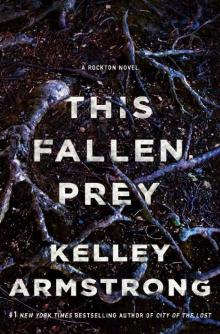 This Fallen Prey
This Fallen Prey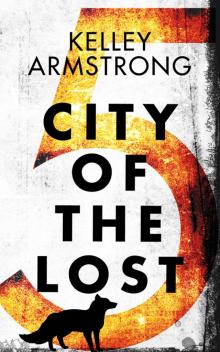 City of the Lost: Part Five
City of the Lost: Part Five Perfect Victim
Perfect Victim Dime Store Magic
Dime Store Magic Personal Demon
Personal Demon Haunted
Haunted Living With the Dead
Living With the Dead Visions
Visions The Summoning
The Summoning Broken
Broken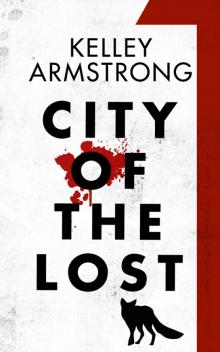 City of the Lost: Part One
City of the Lost: Part One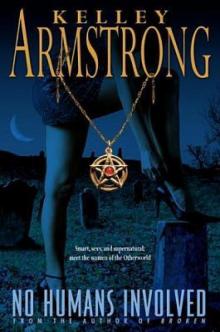 No Humans Involved
No Humans Involved The Awakening
The Awakening The Reckoning
The Reckoning The Gathering
The Gathering Bitten
Bitten Thirteen
Thirteen Gifted
Gifted The Orange Cat and Other Cainsville Tales
The Orange Cat and Other Cainsville Tales Darkest Powers Bonus Pack 2
Darkest Powers Bonus Pack 2 Rituals
Rituals Waking the Witch
Waking the Witch Made to Be Broken
Made to Be Broken Lost Souls
Lost Souls Empire of Night
Empire of Night Wild Justice
Wild Justice Double Play
Double Play Alone in the Wild
Alone in the Wild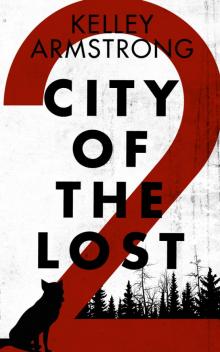 City of the Lost: Part Two
City of the Lost: Part Two A Stranger in Town
A Stranger in Town Watcher in the Woods: A Rockton Novel
Watcher in the Woods: A Rockton Novel Atoning
Atoning Spellbound
Spellbound Wolf's Bane
Wolf's Bane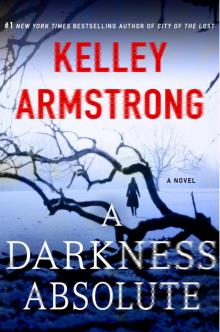 A Darkness Absolute
A Darkness Absolute Ballgowns & Butterflies: A Stitch in Time Holiday Novella
Ballgowns & Butterflies: A Stitch in Time Holiday Novella Wherever She Goes
Wherever She Goes A Royal Guide to Monster Slaying
A Royal Guide to Monster Slaying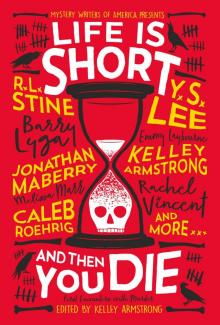 Life Is Short and Then You Die
Life Is Short and Then You Die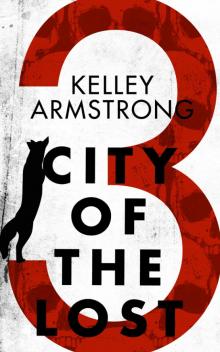 City of the Lost: Part Three
City of the Lost: Part Three Frostbitten
Frostbitten A Stitch in Time
A Stitch in Time Industrial Magic
Industrial Magic Wherever She Goes (ARC)
Wherever She Goes (ARC) Snowstorms & Sleigh Bells: A Stitch in Time holiday novella
Snowstorms & Sleigh Bells: A Stitch in Time holiday novella Exit Strategy
Exit Strategy Forest of Ruin
Forest of Ruin Cursed Luck, Book 1
Cursed Luck, Book 1 The Gryphon's Lair
The Gryphon's Lair City of the Lost
City of the Lost City of the Lost: Part Four
City of the Lost: Part Four Deceptions
Deceptions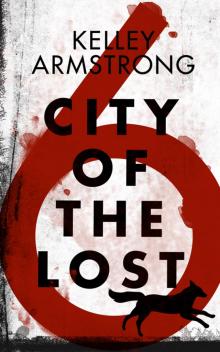 City of the Lost: Part Six
City of the Lost: Part Six Urban Enemies
Urban Enemies Stolen
Stolen Every Step She Takes
Every Step She Takes Portents
Portents Wolf's Curse
Wolf's Curse The Unquiet past
The Unquiet past Omens ct-1
Omens ct-1 Cruel Fate
Cruel Fate The Calling dr-2
The Calling dr-2 The Awakening dp-2
The Awakening dp-2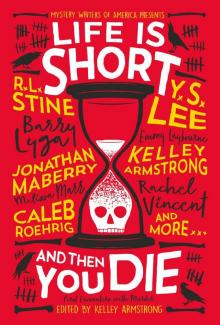 Life Is Short and Then You Die_First Encounters With Murder From Mystery Writers of America
Life Is Short and Then You Die_First Encounters With Murder From Mystery Writers of America Goddess of Summer Love: a Cursed Luck novella
Goddess of Summer Love: a Cursed Luck novella Strangers Among Us
Strangers Among Us The Gathering dr-1
The Gathering dr-1 The Rising dr-3
The Rising dr-3 The Summoning dp-1
The Summoning dp-1 The Hunter And The Hunted
The Hunter And The Hunted Waking the Witch woto-11
Waking the Witch woto-11